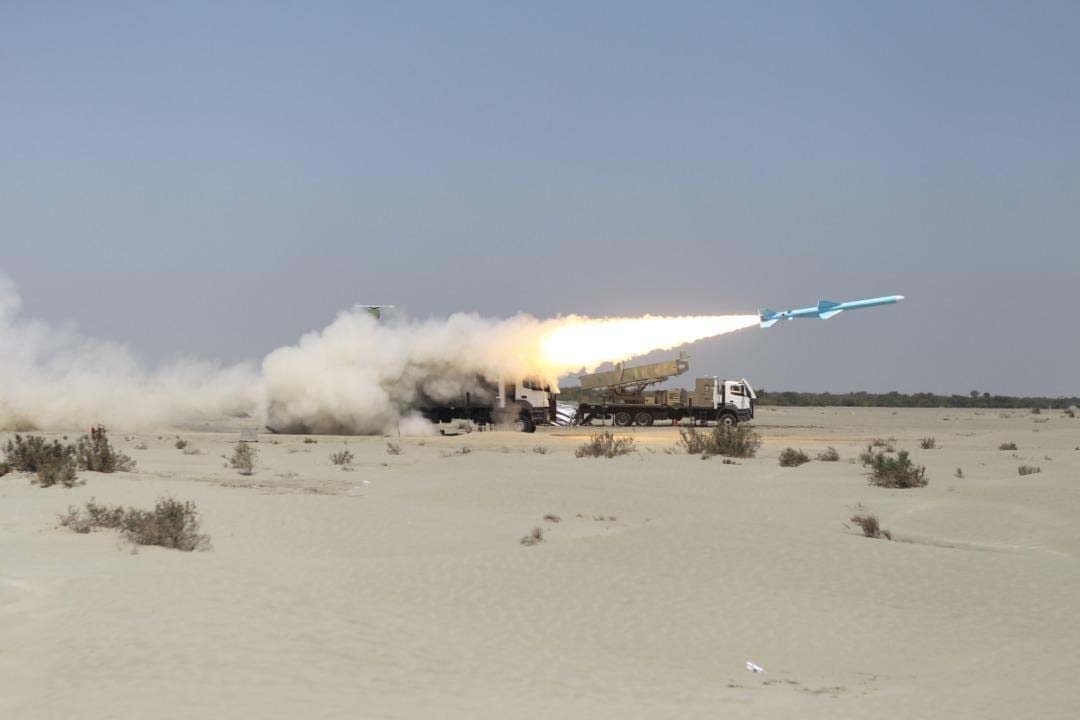In a bold move that echoed across the Middle East, Iran orchestrated a daring strike against Israeli soil, an unprecedented event confirmed by Iran’s state television early Sunday. As distant resonances of heavy thuds and clashing sounds pervaded the air, Israel’s alert sirens signaled an impending aerial attack involving explosive drones launched by Iran’s formidable Revolutionary Guard.
The onset of intense booms and the wailing of sirens marked a harrowing Sunday morning in Israel as Iran initiated a large-scale offensive comprising hundreds of drones, ballistic, and cruise missiles. This marked a significant surge in regional tensions, drawing the Middle East closer to widespread conflict.
Late Saturday, Iran launched drones towards Israel, an act later confirmed by Israel’s military. Iran’s state media announced that a substantial number had been deployed, challenging Israel’s air defense capabilities. This marked the first instance of Iran executing a direct military strike on Israel, despite a history of antagonism rooted in Iran’s 1979 Islamic Revolution.
Israel’s military reported that it faced over 100 drones yet noted its air defenses were primed for the onslaught, with readiness to counterattack. While ballistic missiles were not explicitly mentioned by Israel, Iran acknowledged their inclusion in the assault. The U.S. pledged unspecified assistance, citing its strong military presence in the region.
Rear Adm. Daniel Hagari, the Israeli military’s spokesperson, delivered a televised national announcement stating that it would take several hours for the drones to approach Israeli airspace. Israel could not confirm the interceptions of the drones or their specific targets.
The confrontation risked significant escalation as the United States reaffirmed its ‘ironclad’ support for Israel. Following the Iranian drone and missile strikes, Lebanon-based Hezbollah unleashed dozens of Katyusha rockets against the Israeli Defense Forces’ air defense in the Golan Heights, according to CNN.
Hezbollah released a statement declaring its solidarity with the Palestinian population in Gaza, condemning Israeli attacks on civilian areas. The group confirmed their attack on Sunday at 12:35 am local time. This aggressive stance indicated a deteriorating situation in West Asia and an expansion of ongoing regional conflict. Yemen’s Houthi rebels also launched drones towards Israel in coordination with Iran, Reuters reported.
Security firm Ambrey noted the potential simultaneous arrival of Houthi drones, quoting Al Jazeera. They assessed Israeli ports as probable targets and cautioned of collateral damage in the Red Sea. Meanwhile, CNN reported that the U.S. intercepted several Iranian drones heading towards Israel, with air defense systems deployed in response to the attack.
The sources did not specify the methods or locations of the drone interceptions. UK assets were not actively engaged in intercepting Iranian drones but provided logistical support for U.S. deployments from counter-ISIS operations in Iraq, Syria, and Lebanon, a source familiar with the situation explained.
Israeli officials actively monitored the evolving threats, taking necessary defensive measures to safeguard the nation. Israel watched for potential other forms of Iranian aggression beyond drones. Rear Adm. Hagari noted the possibility of subsequent drone waves and emphasized a strong defensive posture to counter any aerial threats.
In response to the attack, Israel implemented GPS scrambling and restricted its airspace as precautionary measures. The IDF confirmed the UAV launches from Iran via X, stating that their defense forces were on high alert, closely monitoring all targets.
US forces participated in downing some of the explosive drones launched by Iran, according to U.S. defense officials. President Joe Biden and his national security team closely tracked Iran’s offensive, with Biden leaving his Delaware beach house to convene with his team at the White House as Israel reported detecting the drones.
In response to Iran’s aggressive retaliation, the UK deployed additional Royal Air Force jets and air refueling tankers to the region. The British Ministry of Defence affirmed their commitment to preventing escalation and supporting Operation Shader, the UK’s counter-Daesh mission in Iraq and Syria.
Prime Minister Benjamin Netanyahu convened a war cabinet at a military base in Tel Aviv, emphasizing the urgency of the situation. Israeli residents in the Golan Heights were advised to stay near bomb shelters, bracing for potential drone strikes. Both Israel and Lebanon closed their airspace.
Jordan activated its air defenses to intercept any drone or missile incursions into its territory. Syrian sources indicated that the country heightened its ground-to-air defense systems around the capital and major bases.
Israel sought an urgent meeting of the United Nations Security Council, demanding the unequivocal condemnation of Iran and the designation of Iran’s Islamic Revolutionary Guard Corps as a terrorist organization. Israel’s permanent representative to the UN, Gilad Erdan, expressed outrage at the Iranian regime’s attack and its threat to international peace and security.
United Nations Secretary-General Antonio Guterres voiced deep concern over the danger of a region-wide escalation. President Joe Biden, following an advisory session, reiterated the U.S.’s unwavering support for Israel.
European nations, including the European Union, Britain, France, Mexico, Czechia, Denmark, Norway, and the Netherlands, condemned Iran’s aggressive actions.
India urged de-escalation and the return to diplomatic negotiations. The Indian embassy in Israel advised its citizens to stay calm and follow local safety guidelines, closely monitoring the situation.
This dire series of events underscores the fragile balance in the region, with global powers taking positions in a tense and unpredictable theater of potential conflict.




